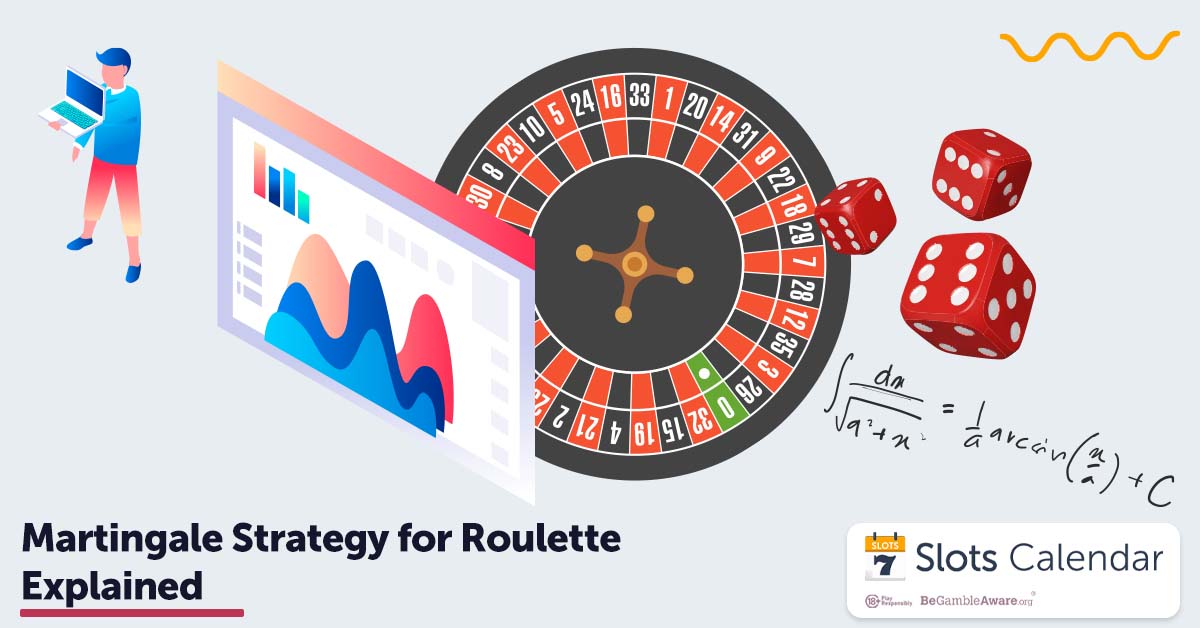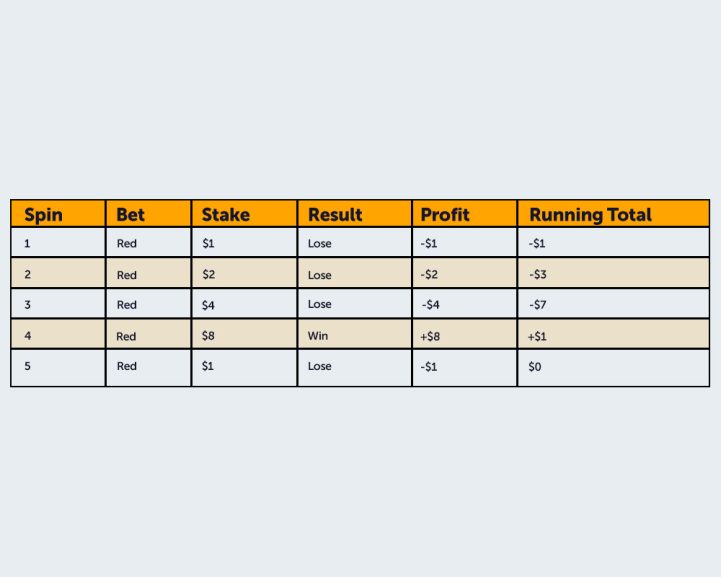You may have heard of the Martingale System, a betting strategy commonly used by gambling enthusiasts who dream of winning big. The system has been around for centuries and has been applied to various games of chance, including coin tosses and horse racing. In this beginner’s guide, we’re going to look at what exactly the Martingale strategy roulette is and how it can help you outsmart the house. We’ll discuss precisely how the system works and break down some of the key points to keep in mind when using it. So, let’s dive right into it!
The Martingale Roulette System: Explained
The Martingale System is a popular betting strategy used in roulette, where the player doubles their bet after each loss in the hope of eventually recouping all losses and making a profit.
It joins other popular strategies players invented in the hope of winning more for their bets. Some of the other roulette strategies are:
- D’Alembert
- Fibonacci
- Labouchere
- Paroli
- Andrucci
The system is named after its inventor, John Henry Martingale, an 18th-century British casino owner.
However, the system’s origins can be traced back to the 18th-century French mathematician Abraham de Moivre, who first described the concept in his book “The Doctrine of Chances“.
Over the years, the Martingale strategy has been the subject of much debate among gamblers and mathematicians. Some argue it is a flawed and risky strategy, while others claim it can be effective when used correctly.
Despite its controversial reputation, this system remains a popular betting strategy in roulette to this day. Nowadays, players are still trying it on different roulette sites to test their skills and luck in winning this exciting game.
How Does It Work?
The Martingale system is a favoured betting strategy among recreational players due to its simple and seemingly logical approach.
Its appeal lies in the “the easier, the better” philosophy, as it does not require memorisation of complex equations or quick mental calculations of wager amounts.
Moreover, it can be easily applied in both online casinos and traditional land-based establishments.
You will require a considerable bankroll and basic math skills to employ the Martingale system at the roulette table. The strategy involves placing bets exclusively on even money outcomes (e.g., red/black or odd/even) and doubling your bet after each loss.
For instance, you commence by placing the minimum bet allowed by the table, which we’ll assume is $5. If you succeed in any wager while utilising the Martingale system, you will always revert to the original $5 stake.
On the other hand, whenever you lose a bet, you will need to double your next wager on the subsequent spin.
For example, if you lose a $5 bet, your following bet should be $10.
If you lose again, you must increase your stake to $20, and so on.
It’s essential to remember that if you win at any stage, you will revert to the initial $5 bet.
The primary objective of the Martingale system is to enable you to accumulate numerous small wins while minimising the likelihood of losing your entire bankroll.
Since you continuously double your wager, every successful bet will result in a $5 profit, whether you win at the $5 level or any other stage after that.
In short, that’s the essence of the Martingale system. It’s usually beneficial to have a predetermined endpoint in mind while using this strategy.
You may opt to continue playing until you’ve attained a specific monetary goal or until a particular duration has elapsed.
Advantages and Disadvantages of the System
Now that we have a basic understanding of how the Martingale system works let’s delve into its advantages and disadvantages. Like any betting strategy, the Martingale system has its pros and cons.
On one hand, it offers the potential for consistent small wins and a relatively low risk of losing your entire bankroll.
However, on the other hand, it can be risky and lead to significant losses if you encounter a long losing streak.
Let’s take a closer look at some of the advantages and disadvantages in the table below:
| Advantages | Disadvantages |
| The system is straightforward and easy to implement. | A losing streak while employing the Martingale system could result in depleting your bankroll at a rapid pace. |
| There’s a chance you could recover your losses. | There are always betting limits on roulette tables, meaning that there’s a restriction on the maximum amount you can bet. |
| In the short run, the Martingale system can generate modest profits. | You may end up placing substantial bets yet only stand to gain a relatively small profit. |
Disadvantages
When using the Martingale system in roulette, it is vital to consider several issues. Firstly, it is a harsh reality that the system can’t help you beat the house edge in roulette.
Even though you may place bets, the casino still retains an edge, and while it may be rare to lose your entire bankroll, such instances will occur frequently enough to cause you to lose money at the anticipated rate over time.
The statement may not be universally applicable, as having an infinitely large bankroll would enable you to continue playing until you win and ultimately gain $5.
However, even for individuals with significantly large funds, the Martingale system has an additional constraint– the maximum bet allowed at the table.
Assuming a minimum bet of $5 and a maximum of $500 on your roulette table, you can place up to seven bets. You can wager $5, $10, $20, $40, $80, $160, and $320 before reaching the maximum limit, where doubling your bet is no longer allowed.
If you lose seven consecutive bets in a cycle, you’ll end up “bust” and lose a total of $635. However, this would only be acceptable if you lose seven times in a row once every 128 cycles, as that would be sufficient to reach a break-even point.
Advantages
Although the earlier restrictions are present, it does not necessarily imply that you cannot or should not use the Martingale system. It is essential to comprehend what benefits you can expect from this approach.
The strategy suits players who are ready to take the chance of losing significant sums occasionally in return for frequent minor victories.
If you apply the Martingale in a casino, most evenings will probably conclude with minor winnings.
Applying the Martingale System to Roulette
The system is commonly used in roulette to bet on even-money propositions such as red or black, odd or even, or high or low numbers.
To use the system, a player would start by placing a small bet on one of these even-money propositions. If the player wins the bet, they would simply start again with a new small bet.
However, if the player loses the bet, they would double their bet on the same proposition for the next spin. They would continue doubling their bet after each loss until they eventually won.
Once they win, they would start again with a new small bet. The system’s goal is to eventually win enough to recoup all losses and make a profit.
However, it’s important to note that while the system can work in theory, there is no guarantee of success. Players should be prepared to potentially lose a significant amount of money if they experience a long losing streak.
How to Play Roulette Using Martingale Strategy?
The Martingale system is a betting approach that centres on recouping any losses. The fundamental concept is to double your wager with each loss on a roulette spin.
Theoretically, this implies that if you eventually win again, you’ll recoup all your previous losses and earn a modest profit.
Below you’ll see how exactly to use the system in a roulette game:
Probability and Statistics Involved in the System
Probability and statistics play a key role in the Martingale System. The system’s base is in the assumption that a win is inevitable, and this assumption is rooted in the laws of probability.
Each spin of the wheel is independent in roulette, so the probability of winning on an even-money proposition is always 18/38 (or 47.37%).
However, the Martingale System also involves statistical analysis of previous outcomes. In order to use the system effectively, players must keep track of their previous bets and adjust their betting strategy accordingly.
They must also have a significant bankroll to cover multiple losses in a row, which is where statistical analysis comes in.
By calculating the probability of experiencing a long losing streak, players can determine how much money they need to set aside to cover potential losses.
Meet the Anti-Martingale System
The Anti-Martingale system is a well-known modification of the Martingale strategy. Its principle involves reducing the bet by half following a loss and doubling it after a win.
While this approach relies on capitalising on winning streaks, it also gradually depletes the player’s funds over time.
As with the conventional system, the law of independent events is the underlying reason for its failure. Ultimately, players will inevitably experience losing streaks that negate any prior gains.
Although there are techniques to mitigate risks when utilising the Martingale betting strategy, they only yield positive results for a brief period and lack any long-term potential.
One such method involves utilising promotional chips, which many casinos offers, and players can use them as wagers but holds no cash value.
If the player wins, they receive the winnings, but if they lose, they do not incur any financial loss. This results in a free bet and alters the odds since the wager has no negative edge.
Criticisms of the Martingale System
The Martingale system is a popular betting strategy that involves doubling your bet after each loss until you win. While this system has its proponents, it is also subject to several criticisms, including:
- Risk of Bankruptcy: One of the most common criticisms is that it can quickly lead to bankruptcy. If you experience a long losing streak, you may bet a lot of money to recoup your losses.
If you run out of money or reach the table limit, you won’t be able to continue doubling your bet and will be stuck with significant losses.
- Limited Profits: Another criticism is that the system is only effective for small bets, as the potential profit is limited.
If you’re playing with a small bankroll, you may not be able to make significant gains using this system.
- Gamblers Fallacy: The Martingale system is also based on the gambler’s fallacy, which is the belief that past events can influence future outcomes.
In reality, each spin of the roulette wheel or hand of blackjack is an independent event, and the result is based on chance.
While the criticisms of the Martingale system are valid, they don’t necessarily make it useless. The risk of bankruptcy is a real concern, but it can be mitigated by setting a strict betting limit and sticking to it.
Additionally, the limited profits can be offset by playing for longer periods, allowing more small wins to add up.
The gambler’s fallacy argument is also somewhat flawed. While it is true that each spin or hand is independent, the Martingale system is based on probability theory.
This suggests that you should experience roughly the same number of wins and losses over a long enough period. This means that if you continue to double your bet after each loss, you should eventually make a profit.
Expert Opinions on the System
The effectiveness of the Martingale system is a subject of division among many gambling experts. Some believe it can be a helpful strategy for short-term gains, while others argue it is too risky and not worth the potential rewards.
In general, experts advise that bettors should use the Martingale system in moderation and with caution.
It can be effective in certain situations, such as when playing a low-risk game with a small bankroll, but it is not a guaranteed way to win money.
Ultimately, the decision to use the Martingale system comes down to personal preference and risk tolerance.
Conclusion: What Is the Best Martingale Strategy Roulette?
Overall, the Martingale Roulette System is just one of many strategies used in Roulette. It can be successful and even exciting if used responsibly.
In playing with this system or any other, always remember to set yourself a comfortable budget or risk limits. You should also take frequent breaks from gaming if you’re feeling overwhelmed.
When trying out any new strategy, it’s best to go into it with a degree of caution and reserve so as not to give away too much at once.
That said, the savvy gambler can gain an advantage over the house by carefully applying strategic approaches such as Martingale Roulette. Just like with any game of skill or chance, weighing up your strengths and weaknesses against the potential rewards before attempting anything is crucial. And above all else, always play responsibly!

 Free Slots
Free Slots












